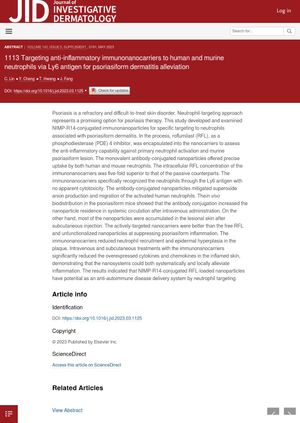Targeting Anti-Inflammatory Immunonanocarriers to Human and Murine Neutrophils via Ly6 Antigen for Psoriasiform Dermatitis Alleviation
April 2023
in “
Journal of Investigative Dermatology
”

TLDR The study created special nanoparticles that effectively deliver an anti-inflammatory drug to treat skin inflammation in psoriasis.
The study developed NIMP-R14-conjugated immunonanoparticles that target neutrophils associated with psoriasiform dermatitis. Roflumilast (RFL), a phosphodiesterase (PDE) 4 inhibitor, was encapsulated into these nanocarriers to assess their anti-inflammatory capability. The immunonanocarriers were taken up by both human and mouse neutrophils, with the intracellular RFL concentration being five times higher than that of passive counterparts. The immunonanocarriers recognized neutrophils through the Ly6 antigen without causing cytotoxicity. They reduced superoxide anion production and migration of activated human neutrophils. In psoriasiform mice, the immunonanocarriers increased nanoparticle residence in systemic circulation after intravenous administration and accumulated in the lesional skin after subcutaneous injection. They were more effective than free RFL and unfunctionalized nanoparticles at suppressing psoriasiform inflammation, reducing neutrophil recruitment and epidermal hyperplasia in the plaque. Both intravenous and subcutaneous treatments with the immunonanocarriers significantly reduced overexpressed cytokines and chemokines in inflamed skin, indicating their potential as an anti-autoimmune disease delivery system by neutrophil targeting.